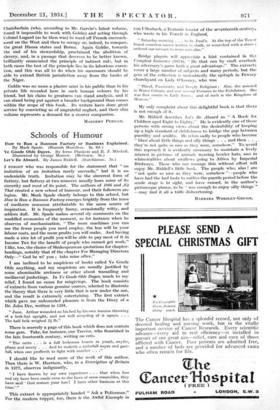A Forgotten Empire Builder
THE object of this book is " to save from oblivion the memory of the Founder of Nigeria." When Lady Gerald Wellesley went to the British Museum Library she found ten full-length biographies of one of the men who in the 'eighties founded a Chartered Company and won a province for the Empire, Cecil Rhodes, and not a single volume upon this other. Why is this ? His destruction of all his papers ? The secrecy to which all Company employees were sworn ? Public lack of interest in black West Africa, for all its wealth ? Or, as the writer suggests, deliberate self-effacement ? But was Goldie, even by the evidence in this book, really a self-effacing man ? The reader must judge for himself.
Sir George Goldie is here presented in two very different forms. The second part is the story told by a poetess of her friendship as a child with this vital and dominating man, a charming and intimate, picture at least as revealing of herself as of her friend. Most of this—for it contains some historical judgements—the reviewer can only accept with appreciative sympathy, and the following comments apply chiefly to the historical introduction by Mr. Gwynn.
He rightly reminds us of the great achievement of this remarkable man : that at a time when England was uncertain or uninterested and Germany and France were feverishly at work upon the blank map of Central Africa, he by his faith and courage kept the English flag flying upon that great river which, with its tributary Benue, trisects Nigeria. He showed his ability equally in the counting-house, as the mainspring of the only Chartered Company that consistently paid divi- dends ; in the field when it came to fighting native poten- tates ; in diplomacy at the Congress of Berlin. This is surely enough : but does not the spirit of vindication which very naturally inspires the book run on to claim too much ? What Goldie gained for England was the control of the lower Niger, and this, though the main artery of today's Protectorate, is yet something less than Nigeria. There arc three important points the writer would not learn from this book. Long before Goldie ever came to Nigeria the Government had annexed Lagos outright, and had already begun an encroach- ment upon that Yoruba hinterland which forms today one of the most important and advanced parts of Nigeria. Secondly, years before the formation of the Company, the Government by its naval and consular activities had paved the way for the Protectorate over the Nigerian Coast from Lagos to the Cameroon border which received international sanction in 1885. And, thirdly, Goldie did not gain more than a fraction of Northern Nigeria for the Empire. He gained access to it and staked out a claim as against other Powers—itself a great achievement. But it was for the Government, galvanized by
Chamberlain (who, according to Mr. Garvin's latest volume, found it impossible to work with Goldie) and acting through Colonel Lugard (as he then was) to ward off French encroach- ment on the West and then to occupy or, indeed, to conquer, the great Hausa states and Bornu. Again Goldie, towards the end of his stewardship, proclaimed the abolition of slai,ery, and, in a passage that deserves to be better known, brilliantly enunciated the principle of indirect rule, but in both cases the test of the principle lies in its laborious execu- tion, and this was all to do when his successors should be able to extend British jurisdiction away from the banks of the Niger.
Goldie -was no more a plaster saint in his public than in his private life revealed here in such human colours by his friend, but his claim to greatness can stand analysis, and it can stand being put against a broader background than comes within the scope of this book. Its writers have done great service by convicting us of ungrateful neglect, and their slim volume represents a demand for a stouter companion..
MARGERY PERHAM.



































 Previous page
Previous page